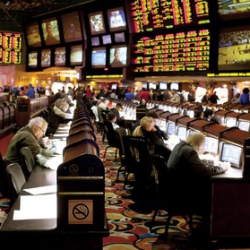
The Westgate Las Vegas Is One of the City’s Most Successful Sportsbooks. It Was Named Las Vegas Hilton until 2011.
Noah Feldman of the Bloomberg View had an op-ed column appear in the Chicago Tribune on Friday discussing the US 3rd Court of Appeals’ ruling on the New Jersey sports betting case. Mr. Feldman wrote that the court’s decision against New Jersey was unfair, just as the Professional and Amateur Sports Protection Act is unfair.
The opinion is beginning to be familiar in the ongoing debate over PASPA. Columns from political pundits and gaming analysts across the United States have said the same in the past year, while a number of sports executives have begun to change their tune–including those who represent the leagues which crafted PASPA.
New Jersey vs The Sports Leagues
The New Jersey court case sprang from a lawsuit filed by the NBA, MLB, NHL, NFL, and NCAA. Those sports associations say legal sports betting in New Jersey (and across the USA) would damage the integrity of their sports. That is the argument which was used in 1992 to pass the PASPA law, which bans sports betting in all but 4 states.
Yet Commissioner Adam Silver of the NBA has said sports betting will be legalized in the United States and has called for a federal law to regulate sportsbooks. Major League Baseball’s new commissioner, Rob Manfred, has said the baseball owners need to discuss a new approach to sports betting–meaning he has come to the same conclusion as Adam Silver. NHL commissioner Gary Bettman admitted his sports is not as affected by sports betting, despite being a party to the lawsuit. He’s going along to support his fellow sports commissioners.
That leaves Roger Goodell of the NFL, who has given no official stance on regulated sports betting. Goodell is too busy fighting a months-long court battle with one of his league’s most popular stars, apparently over deflating–though 11 of the 12 balls measured were within NFL standards. The NFL has bigger (or smaller) issues to consider.
Adam Silver’s in the New York Times
In retrospect, the Adam Silver op-ed piece in The New York Times is likely to be seen as the seminal moment in the sports betting debate in this country. While New Jersey has been fighting a court battle and losing it, the NBA’s front office has undergone a sea change in its attitude towards sports gambling. When Adam Silver decided to speak out publicly about that sea change, people’s opinions began to change.
Joe Asher of the William Hill Sportsbook in Las Vegas said, “That (op-ed) piece completely changed the dynamic around the issue.”
What Adam Silver brought out in the open is the PASPA has failed–and it has failed miserably. The PASPA has done several things. First, Las Vegas has maintained a monopoly on legal sports betting in the United States, enriching its coffers immensely. Also, three states (Montana, Oregon, Delaware) have been able to maintain sports lotteries, while other US states were banned from doing so.
Some States Banned, Others Protected
Those four states were given a pass because their gambling laws were grandfathered in to the PASPA. No one can say why their sports betting wouldn’t destroy the integrity of American sports, but New Jersey’s sportsbooks would. In fact, many have said the federal government discriminating between states on this issue is a violation of the Commerce Clause of the U.S. Constitution.
Besides those arguments, Adam Silver’s op-ed piece underscored the key reason the PASPA has failed: it has allowed an enormous black market to spring up. Adam Silver estimates that illegal sports betting generates $300 billion to $400 billion of revenues each year, while Las Vegas generates $3 billion.
The Black Market of Betting
The PASPA hasn’t ended sports betting. It has driven gambling underground, enriching bookies, swelling the coffers of organized crime, and making it more likely those operators will undermine the sports by fixing games. Give crooks more money and they’re going to invest it in more criminal enterprise.
The same cannot be said of legal sportsbooks. They’ll build more amenities–maybe a nightclub or a spa–and try to drive more customers. And if legal sports betting were going to lead to match-fixing…well, the international sports books still take bets on games, and match-fixers overseas would have the resources to fix games as well as Americans could. The PASPA rests on a ridiculous argument.
As Joe Asher added, “The current policy on sports betting has failed. You have this massive black market all around the country. The only place it’s legal is Nevada, Delaware and Montana. Outside of those states, all the money is going to criminals.”
“And whose interest does that serve?”, added the oddsmaker. “Certainly not the interests of the leagues; it does nothing to protect the integrity of their games. It does nothing to promote job growth or create tax revenue, and it definitely does not protect the customers. Something needs to be done to fix that.”
Jay Kornegay Disagrees
Not everyone sees it that way. Jay Kornegay of the Westbook Las Vegas Sportsbook He says that the sportsbooks on the Vegas Strip have world class amenities which draw many customers.
Their books’ betting and viewing rooms are second to none, providing an amazing gaming experience for the bettors. Kornegay says an Iowa riverboat casino “would have a tough time emulating Las Vegas.”
I Nelson Rose on Sports Betting
I. Nelson Rose, Whittier School of Law professor and writing on the gaming culture, said the changes in the NBA’s leadership’s attitudes only reflect a societal change.
Professor Rose said, “The protectors of morality are governments and churches. When churches are running bingo and government is first licensing and then operating legal gambling, and actively promoting state lotteries, it changes things.”
In other words, once the churches and the state governments got into the gambling business themselves, it was only a matter of time before sportsbooks would be legalized.
